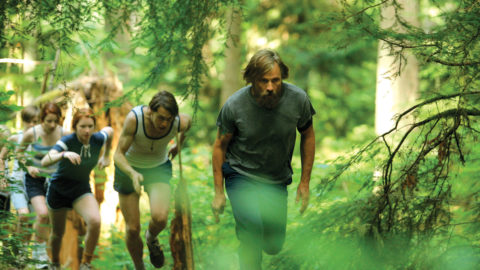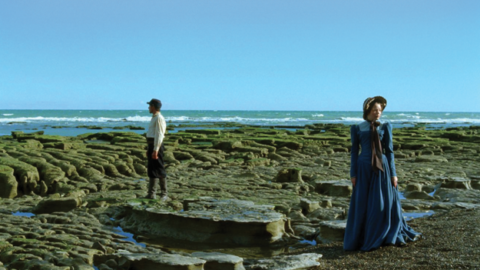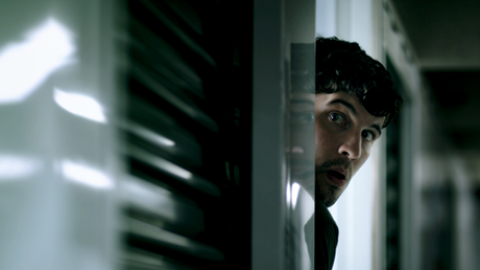Film of the Week: Leave No Trace
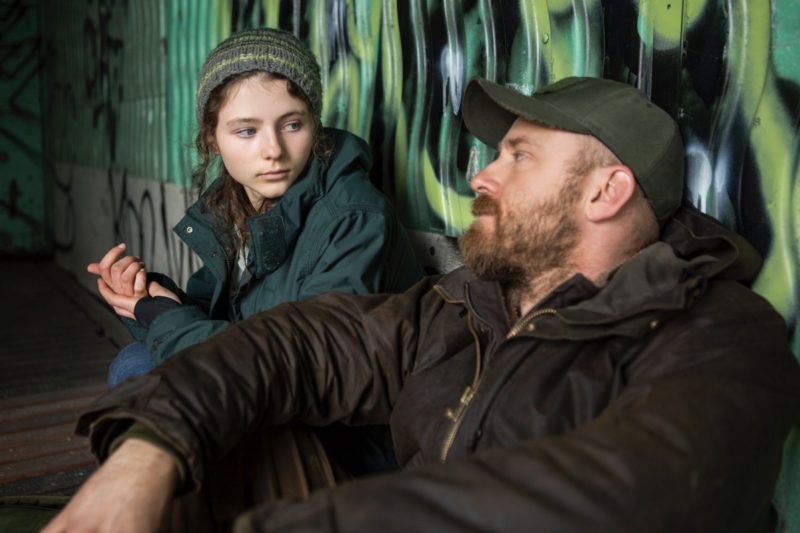
The first thing that comes to mind watching Debra Granik’s Leave No Trace is Andrew Marvell’s phrase “a green thought in a green shade.” At the very start, the film is steeped in the richest, deepest, greenest shade you can imagine, as a man and a teenage girl, viewed from above, walk through thick forest. Shot by Michael McDonough, the film is dominated by variations of green—from the chlorophyll-charged intensity of the forest to the murky, faded khaki that’s the camouflage uniform of a father and daughter living wild in nature, permanent campers. When we see a close-up of an orange being peeled, the new color comes as a shock, it’s so vividly incongruous. You can almost imagine the film’s father character Will (Ben Foster) rejecting this particular fruit as decadent, falsely glamorous. To his daughter, however—and to us—it’s an intense burst of sunlight, an explosion of summer in the shadowy undergrowth world she’s been inhabiting.
Granik came to prominence as an observer of American outsider lives with her hugely successful second feature Winter’s Bone (2010), the Ozarks-set thriller that put Jennifer Lawrence on the map; she consolidated that reputation with her 2014 documentary Stray Dog, a character portrait of a veteran biker. Her long-awaited fiction follow-up to Winter’s Bone is about people who choose to be outside the system—or rather, about a man who makes that choice and imposes it, for better or worse, on his child. We first see Will and his daughter Tom (newcomer Thomasin Harcourt McKenzie) pursuing their meticulous rituals of eco-conscious survival in the forest—nibbling leaves, eating eggs then carefully recycling the crushed shell as fertilizer, coaxing a flame out of firewood to roast a mushroom. Life is a daily challenge, and it involves hardship: Will tries to light kindling, but it’s wet and Tom is hungry. This is a film which takes off-grid living and its rigors absolutely seriously—unlike Matt Ross’s jokey Captain Fantastic, which toyed admiringly with that lifestyle but was mainly interested in portraying its characters as idealistic, goofy misfits.
When Will puts Tom through a drill, we can tell that they’ve done it time and time again: it’s all about not being found by them. But why would they be after these quiet, nature-respecting loners, who are clearly doing no one any harm? Because society claims the right to decide who lives outside it, and to reel in—by force, if necessary—those who prefer to secede. Adapted by Granik and Anne Rosellini from Peter Rock’s novel My Abandonment, the film provides certain clues to Will’s past and his reasons for wanting out: his tattoos, a news cutting, his intense aversion to helicopter sounds all signal the traumas of war. We also see that he’s a canny operator who knows how to bend his own rules when necessary: strict practice would entail living only off the land, but survival involves visiting the Veterans Crisis Center in nearby Portland and trading the meds he gets there to other forest dwellers.
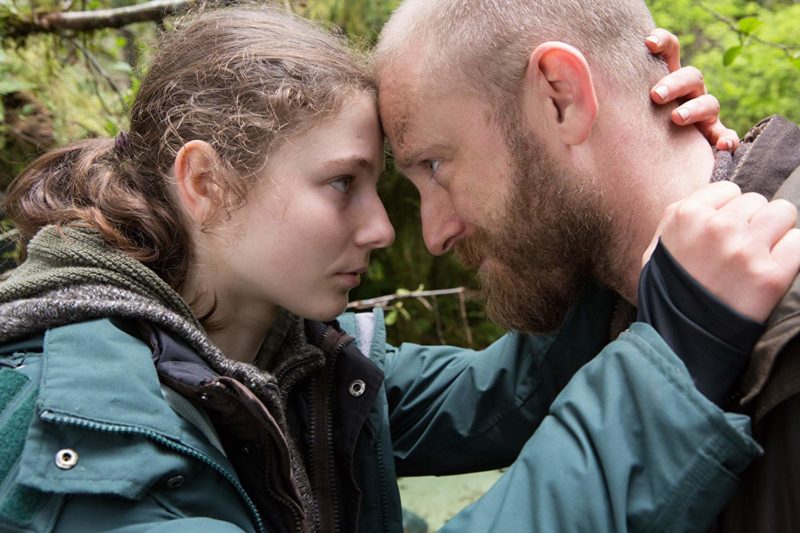
The day comes, however, when the drill is not just a drill, but for real. Forest rangers come after the pair, and they’re apprehended and separated. The authority figures we meet are somewhat benign, and Tom is relatively old (in her early teens), but Leave No Trace has acquired a particular resonance at a moment when we’ve seen American authority forcibly separating parents and young children. Tom is sent to a center for juveniles in care, while Will is questioned by police; both are submitted to mental profiling tests. The one that Will faces is particularly telling; conducted by a robot voice, the true/false questions he’s asked to agree or disagree with are nothing if not ideologically loaded, underwritten by a coercive pressure to integrate: “I am a strong team player,” indeed.
The pair are provided with a new home—comfortable and bland, in a comparatively sanitized area of the great outdoors, where they’re given socially useful things to do, and where Tom clearly begins to feel the pull of community. “Everything’s different now,” she says. Will retorts, “We can still think our own thoughts.” And he’s right—but Tom is thinking her own, and they’ll eventually pull her away from him. The world they’ve landed in makes big happy gestures at the pair: there’s a church meet-and-greet where everyone’s perfectly nice, but it feels a lot like enforced socialization. There’s even a dance troupe there called For His Glory, who wave veils to rock guitar—but it’s a sign of Granik’s seriousness and generosity that they’re not make to look ridiculous, as they would be in so many films.
It’s not so much society that attracts Tom, just sociability and a sense of wider possibility: she discovers that there are people in the world other than her dad, other creatures too. The real thrill for her is meeting a boy who happens to be a rabbit fancier; a gathering of bunny lovers with their huge, bulbous, quivering charges is every bit as thrilling a revelation as that orange, and for the viewer, that scene is a simple, odd joy, one of those small, curious revelations that realist cinema can sometimes provide. Gradually, Tom’s burgeoning independence of thought is making her into her own person, and also perhaps turning her and Will into a more conventional father-daughter pair than he could have imagined. Suddenly he’s sitting at home wondering where the hell she’s got to, in the way of teenagers’ parents from time immemorial. Eventually, the couple escape back to the wild, which is now harsher and more forbidding: this time they’re squeezing out clumps of grass for drinking water. And a decisive moment comes—in a nice reversal—when it’s Will who doesn’t come home on time.
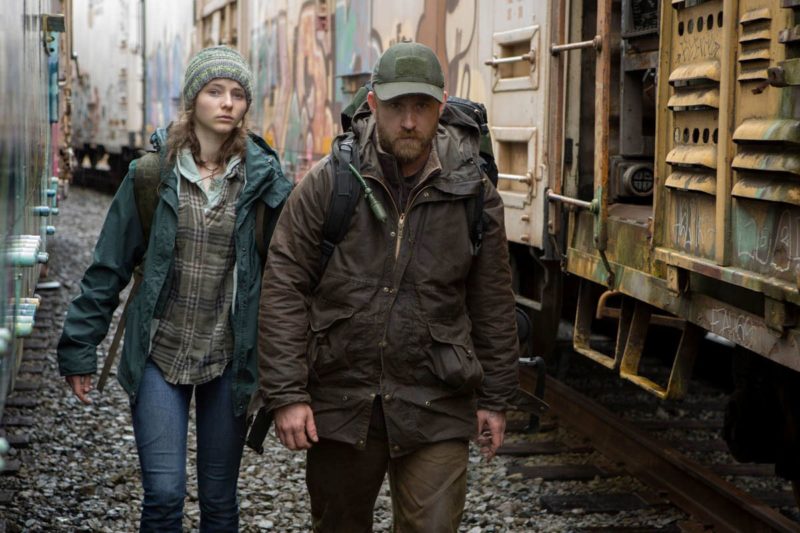
This is a story about ethical choices, beginning with the dilemma suggested in the title. Will believes in leaving a minimal footprint on the environment, as well as staying invisible, untraceable by society’s radar. But the trace no parent can avoid is the one they leave on their children, even if it proves to be a print in negative, the stamp for them to reject. We admire Will—his principles, his genius, his tenderness and talent as a father. At the same time, we may well recoil at his imposing his rigorous code on a child who has had no say in the matter. Little wonder that Tom gravitates to community and some form of insiderdom—even if the version she chooses is a marginal, supportively dissident one. But what Will has tried to do is only what all societies do, and all parents, who insist that their children conform to the beliefs—religious, cultural, political—that they cling to.
Granik’s film is impressive because it enacts these contradictions in a very concrete way: we’re acutely conscious of the very tactile world the pair live in, of the dampness of the undergrowth, the beating of rain on their tent roof, the reassuring dry warmth of the houses they find themselves occupying. Granik is also deeply empathetic towards people, as emotionally open towards authority figures like Dana Millican’s social worker as to the bee keepers and trailer dwellers, the weather-beaten, no-frills human beings whom Tom comes to connect with.
Leave No Trace is finely acted and insightfully cast—Granik, once again, knows that the lines that count in a film aren’t necessarily the ones spoken, but those etched on a person’s face. Foster, his Will taut and careworn, evokes a man who’s suffered but retained a capacity to love and the dignity not to reveal too much of what’s he’s lived through; he plays a man retreating into himself, not so much because he’s damaged, but because he has chosen to pare his self down into a minimal survival kit. And newcomer Harcourt McKenzie is a terrific find. Evoking both fragility and resilience, her pale, fine face isn’t conventionally expressive—Tom has learned to be as cautiously reserved as her father—but it gives the impression of a keen, kind intelligence, a constant alertness. She’s one of those young screen presences that doesn’t shout out for your attention: it’s only after you’ve spent a while with it that you realize that, quietly, undemonstratively, she has held you mesmerized.
Jonathan Romney is a contributing editor to Film Comment and writes its Film of the Week column. He is a member of the London Film Critics Circle.



